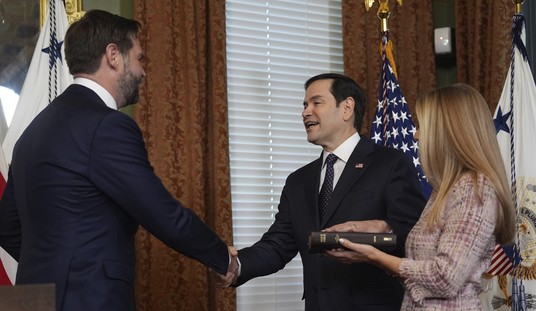Remember how Barack Obama ended the war in Iraq? Apparently news has belatedly reached the White House that not only has the war not ended, but their strategy to defeat ISIS has just as much connection to reality as their earlier assessment. The Hill’s Kristina Wong reported last night that the Pentagon has begun to consider a much more significant ground presence for the US, one that would put American troops back in combat in a war that supposedly ended with our withdrawal more than four years ago:
Top leaders at the Pentagon are considering a range of options to bolster the military campaign against the Islamic State in Iraq and Syria (ISIS), including embedding some U.S. troops with Iraqi forces, according to two U.S. officials.
U.S. military commanders have forwarded several options to the Defense Department in the last few weeks, the officials told The Hill, as part of a mounting push within the administration to more aggressively target the terrorist group.
One of the options presented was embedding U.S. troops with Iraqi security forces; they would have the ability to call in airstrikes, a step that would bring American forces to the front line.
But even without a role in direct combat, that option would skirt close to having “boots on the ground” in Iraq — something President Obama has vowed not to do in the military campaign against ISIS.
The Washington Post’s Missy Ryan and Greg Jaffe call this a “significant escalation” of the US position — and that it won’t be limited to Iraq, either:
The changes would represent a significant escalation of the American role in Iraq and Syria. They still require formal approval from Obama, who could make a decision as soon as this week and could decide not to alter the current course, said U.S. officials who spoke on the condition of anonymity because the discussions are still ongoing. It’s unclear how many additional troops would be required to implement the changes being considered by the president, but the number for now is likely to be relatively small, these officials said.
The recommendations came at Obama’s request and reflect the president’s and his top advisers’ concern that the battle in Iraq and Syria is largely stalemated and in need of new ideas to generate momentum against Islamic State forces.
“Largely stalemated” is more of a euphemism for “failure.” The strategy announced by Obama more than a year ago, when Obama promised to “degrade and destroy” ISIS, involved only US air power combined with coalition forces from other Sunni nations. None of those coalition partners wanted to put boots on the ground either, as it turns out, and ISIS has expanded its grip on territory in Iraq and Syria ever since. That’s not a stalemate; it’s a retreat.
Some Republicans on Capitol Hill have called for the imposition of a no-fly zone, an idea which Hillary Clinton has also recently endorsed. The Obama administration will not contemplate even that half-measure, however, because of Russia’s entry into the fight on behalf of Bashar al-Assad:
More costly and ambitious measures, such as no-fly zones or buffer zones that would require tens of thousands of ground troops to effectively protect innocent civilians, did not receive the backing of any of Obama’s top policy advisers. Democratic presidential front-runner Hillary Rodham Clinton has said that she favors a no-fly zone in Syria.
Senior U.S. officials, however, warned that such measures had the potential to put the United States in direct conflict with the Syrian regime and the Russian and Iranian forces backing it.
In other words, the Obama administration is still hedging its bets, moving incrementally to deal with the expansion of ISIS rather than forcefully. Thanks to almost two years of dithering while ISIS rose from the dust of its previous incarnation as al-Qaeda in Iraq to seize wide swaths of territory and conduct genocides unchecked, the potential for a military clash between the US and Russia has now become a reality with which the US has to contend. This demonstration of weakness was at first self-inflicted; now it has become a self-fulfilled prophecy.
With that in mind, one has to wonder whether any further American involvement should be pushed. Escalations in dribs and drabs to preserve the political viability of the current administration sounds like a good way to get lots of people killed, especially those Americans deployed in what will likely be ridiculously circumscribed rules of engagement. Either we fight a war to win it and take control of territory, or we shouldn’t put assets on the ground at all. ISIS is enough of a global threat for the former approach, but absent that kind of commitment, there is little point in supporting a strategy that just maintains the status quo or worse while making it look as though the US is committed to victory.
Related: Andrew Malcolm tries to figure out the administration’s position after last week’s raid on an ISIS prison that exchanging fire with the enemy isn’t actually “combat”:
On Monday, Obama’s press secretary, Josh Earnest, took a very deep breath and sought desperately to avoid creating a sound-bite containing the word “combat”:
“Our men and women in uniform who are serving in Iraq in a train, advise and assist role are serving their country in a very dangerous place.
“And in the situation that occurred at the end of last week, you had American military personnel who are serving in an advisory capacity as Iraqi Peshmerga forces carried out a dangerous operation, and when those forces that are backed by the United States came under fire and were pinned down, our special operators in the field made the decision to respond.
“And it put them in a situation where, yes, they were exchanging fire with the enemy.”
But that’s not combat. So, how about we plunk Word-Boy down in a firefight, see if maybe his definition changes.
These are not serious people, and certainly not the kind of leadership needed to win a war.








Join the conversation as a VIP Member